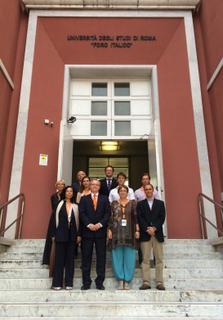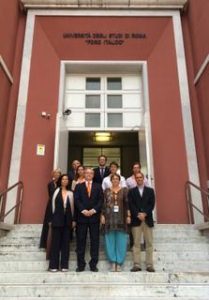NEWS
Dear Members of EAS,
Dear Friends,
It is a great honour and privilege for me to have been elected by the Member of EAS as your President for the next term. I would like to thank Tibor Kozsla and the members of the Executive Committee for their dedication in carrying out the activities of the network over the past years. I am more than pleased that the General Assembly voted the inclusion of the Past-President position in the Executive Board. Then, Tibor Kozsla and Risto Keskitalo will not only represent the continuity with the past but we all will benefit from their wise advices and experience.
I am looking forward to working with them and with the members of the new Executive Committee. In recognition of their past work, Ilvis Abelkalns, Mojca Doupona-Topic, Joerg Foerster and Veronique Laseur have been re-elected. As new elected Members of the Executive Committee, Antonio Figueiredo and Ole Keldorf will provide new insight to the group. To allow our Network being more effectively and widely represented in International meetings, the Executive Board appointed Joerg Foerster as Secretary General and Mojca Doupona-Topic as Treasurer.
I had the privilege of getting involved in EAS under the Presidency of Bengt Nybelius. He was a visionary with good leadership skills. The inclusion of the EAS Conference within the collateral activities of the Italian Presidency of the European Union testifies that he created a Network of international acclaim. Although some difficulties in organizing the registration during the Summer period were present, this recognition is highly estimated and poses our Network under European strategies.
Over the past ten years, EAS has been fully committed to the discovery of best practices and of potential solutions for effective dual career paths and education models for student-athletes. Today, Europe that still asks us not to leave many talented men and women athletes feeling distant from higher education or elite sport, with an uncertain future career. It is time for action. We need to have services to be proud of, services that meet the needs of our talented athletes, and services that European talented athletes will be willing to use.
To pursue this challenge we need to work in close cooperation with Universities, Sport Bodies, and Policy Makers. The renewed European political support to EAS in Europe has been confirmed by the participation of Agata Dziarnowska – Policy Officer at the European Commission DG EAC. Furthermore, the contribution of Margo de Lange – Officer of the membership-based European Network of Academic Sports Services (ENAS), Andrej Pisl – Communications and Projects Manager at the European University Sports Association, Kole Gjeloshaj – coordinator for protocols and director of educational services at the International University Sports Federation (FISU), and Marco Di Donato – Researcher at the Association of the Mediterranean Universities (UNIMED) testified the need of a cooperative and respectful spirit between actors with different specificities.
The power of a Network, of a group of people with a shared purpose, is inspiring. EAS has to challenge its capabilities to work together in delivering what is best for our student-athletes in Europe. The network will greatly benefit from the experience and advices of members from Northern European Countries where dual career policies are in place and implemented. It is crucial to pay attention in establishing an effective dialogue with Institutions from the Mediterranean countries, which are not adequately represented in our Network, despite their need for dual career systems. Furthermore, we have to provide better support especially to talented youth girls, who often abandon their sport commitment in favour of a higher education. I do believe that EAS is uniquely capable of answering this society’s call having such a strong experience. EAS is able to speak to both the resilient academic world and to the sport world that could be too-much performance oriented. As an academic in sport sciences, I am aware that differences among cultures and institutions could become strength when a dialogue is established. It is not an easy task but I am confident that EAS and its members will have plenty of opportunities to approach Universities and sport bodies at National and European levels.
I have been passionate about training and education over most of my career and I am grateful to you for giving me this opportunity. I do promise to do my best for our Network and for the European athletes wishing to combine sport and academic careers.
Yours sincerely,
Laura Capranica



